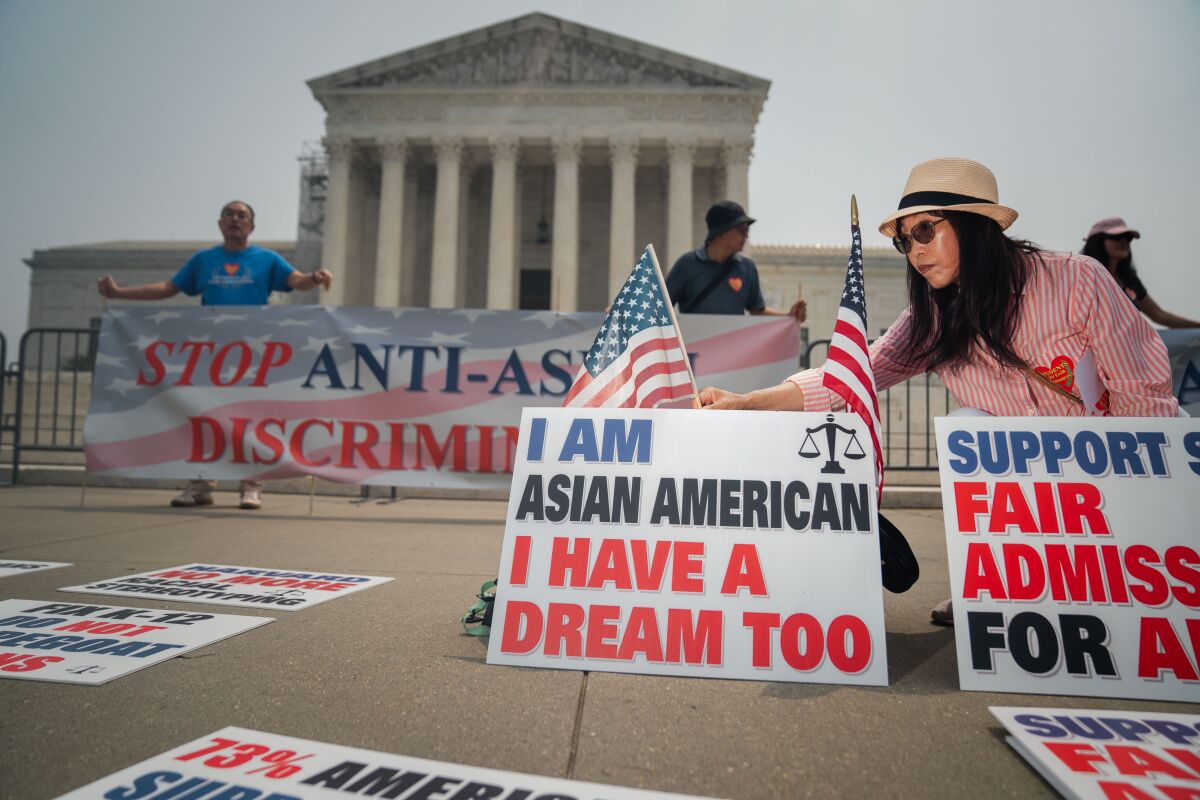- Joined
- Feb 26, 2019
- Messages
- 12,449
- Points
- 113
A question for Asian Americans celebrating affirmative action’s end: What have we won?

Members of Asian American Coalition for Education rally Thursday outside the U.S. Supreme Court in Washington, D.C.
(Kent Nishimura/Los Angeles Times)
BY FRANK SHYONGCOLUMNIST
JULY 1, 2023 5 AM PM
A few minutes after the Supreme Court struck down affirmative action, an email from the 80-20 Initiative, a Chinese political action group, landed in my inbox with the subject head “VICTORY.”
I racked my brain, but I couldn’t think of anything about Thursday’s decision that was a victory for Asian Americans. What have we won?
In their email, the 80-20 Initiative’s answer was “Equal opportunity for Asian Americans in education.” But that is false. The court’s ruling makes the current method of achieving a diverse student body illegal, but doesn’t replace it with anything. Colleges and university systems must create their own.
There is no guarantee that Harvard or any other elite university will admit more Asian American students. My guess is that a transitional patchwork of different diversity strategies will actually make the college application process more confusing and less transparent. And all methods of producing a diverse student body are more vulnerable to legal challenges, now that the case against Harvard succeeded in the nation’s highest court.
It’s still too early to know how college admissions by race will change. Colleges will still attempt to produce racially diverse student bodies, but considering race in the process is not allowed. It’s like trying to take a test blindfolded, but failing is illegal. One predictor is what happened after California’s affirmative action ban in 1996. White and Asian student enrollment throughout the University of California system rose slightly, while Black and Latino enrollment at UCLA and Berkeley fell by 40% the first year the ban was implemented.
But even those gains in Asian student enrollment can’t be attributed entirely to race-blind admissions. At the time, cash-poor universities and colleges in California were drastically increasing their admissions of international students, largely from Asian countries, because those applicants paid premium tuition fees.
So we have to ask ourselves, truly, what have we won? Every Asian American and anyone else who considers Thursday’s decision a victory should wonder.
An easier question to answer is what we have lost.
America’s racial tolerance is enshrined in a set of laws and legal opinions that make the practice of some forms of racism illegal. Affirmative action was a major foundation of those protections. It began as an executive order by President Kennedy in 1961 requiring federal contractors to implement fair hiring practices around race. It was a flawed policy with many valid criticisms, but affirmative action represented the federal government’s primary recognition that the wrongs of racism should be corrected.
It’s why the Los Angeles Police Department and countless other institutions got more diverse. A 1995 study found that affirmative action had added 6 million women to the workforce. Black families who never had equal access to the American dream were able to enter the middle class in record numbers. And many low-income Asian Americans, especially those with Southeast Asian, Filipino and Pacific Islander backgrounds, became the first people in their families to attend college.
That’s what we lost. But we can’t properly assess victories and defeats without knowing what our values are. Maybe a better question to start with is: Why did we come to America?
Immigrants are sold a simple, seductive story about America. Here there is wealth, freedom and equality, along with rock and roll music and Hollywood — a better life. I know that story because every time I asked my parents why we came to America, I received that idealized answer: We came so that you could have a better life.
That story spurred our families to sacrifice, and to remain silent about the racism and discrimination we ourselves experience. Because we’ll pay almost any price to make the story true and our sacrifices worthwhile. The hostility and violence mean nothing next to the checks we sent home to our families and the food in their bellies.
Our lives become extended arguments over whether that decision to come to America was correct. And we become deeply invested in that idealized America, because otherwise, what was it all for?
So when we are confronted with America’s racial realities, we look away because slavery, institutionalized racism and xenophobia were not part of the story we were sold. We decide to embrace the term “model minority,” because at least that term conveys a modicum of respect and acceptance and perhaps improved treatment.
We want our dreams to be true so badly that we become selfish. We narrow the sphere of our concerns to just our family, and we say that is enough.
But some of those families have become the unwitting pawns of conservative activist Edward Blum’s decades-long effort to dismantle affirmative action. Now we must all live with the consequences. Any Asian American looking to the Republican Party needs to remember how quickly and carelessly conservatives resorted to xenophobic language during the pandemic, which unleashed an unprecedented wave of anti-Asian violence.
We have chosen the American dream over American reality because the truth is ugly. It’s former President Trump tweeting about the “Chinese virus.” It’s the brutal street assaults on Asian American seniors in Oakland, San Francisco, New York and Los Angeles. It’s the six Asian women shot to death at Atlanta-area spas in March 2021. It’s the newfound fear that some Asian Americans feel taking the bus, walking down the street, or standing on a subway platform.
This is not the America we were told about. So why did we come?
Here’s my answer: We came here because we could not stay there. We came not just to live and work, but to form a new community. And we still have a lot to learn about that.
Source:https://www.latimes.com/california/...eme-court-affirmative-action-what-have-we-won
